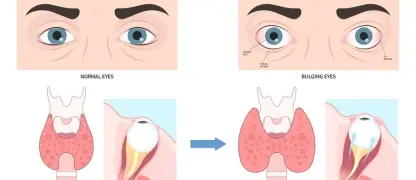Unexplained weight gain and fatigue could be more than just lifestyle issues. Understanding Cushing's syndrome symptoms is vital for an early diagnosis, preventing serious long-term complications caused by high cortisol levels and getting the right treatment.
What are the main causes of Cushing's Syndrome?
- The most common cause is the long-term, high-dose use of oral corticosteroid medications, which have effects similar to the body's natural cortisol.
- A noncancerous tumor on the pituitary gland can overproduce a hormone that stimulates the adrenal glands, a specific condition known as Cushing's disease.
- Tumors on one of the adrenal glands, which sit above the kidneys, can also directly lead to the overproduction and release of excess cortisol.

Key symptoms of Cushing's Syndrome to watch for
- A classic sign is weight gain with fatty deposits between the shoulders (a buffalo hump) and a distinctively rounded face, often called a moon face.
- Your skin may become thin and fragile, bruise very easily, and develop prominent, wide purple or pink stretch marks on the abdomen and thighs.
- Other signs include severe fatigue, muscle weakness, high blood pressure, and psychological changes like depression, anxiety, or irritability due to high cortisol levels.
How can you prevent Cushing's Syndrome effectively?
- When taking corticosteroid medications, work with your doctor to use the lowest dose needed to control your disease for the shortest possible time.
- If you must take steroids long-term, be aware of the potential signs and report any Cushing's syndrome symptoms to your doctor immediately for monitoring.
- For endogenous causes like adrenal tumors, prevention isn't possible, so early detection through a cortisol test is crucial for effective treatment and management.
>>> Don't miss: Gout - What to eat and what to avoid during a flare-up
Image of the disease Cushing's syndrome







>>> Learn now: Polycystic ovary syndrome - A guide to managing PCOS symptoms
Recognizing the signs of Cushing's syndrome is the first step towards getting answers. If you are concerned about your symptoms or high cortisol levels, consult an endocrinologist for a proper cortisol test and a definitive diagnosis.
>>> Learn fully at: Addison's disease - Recognizing the signs of adrenal insufficiency





